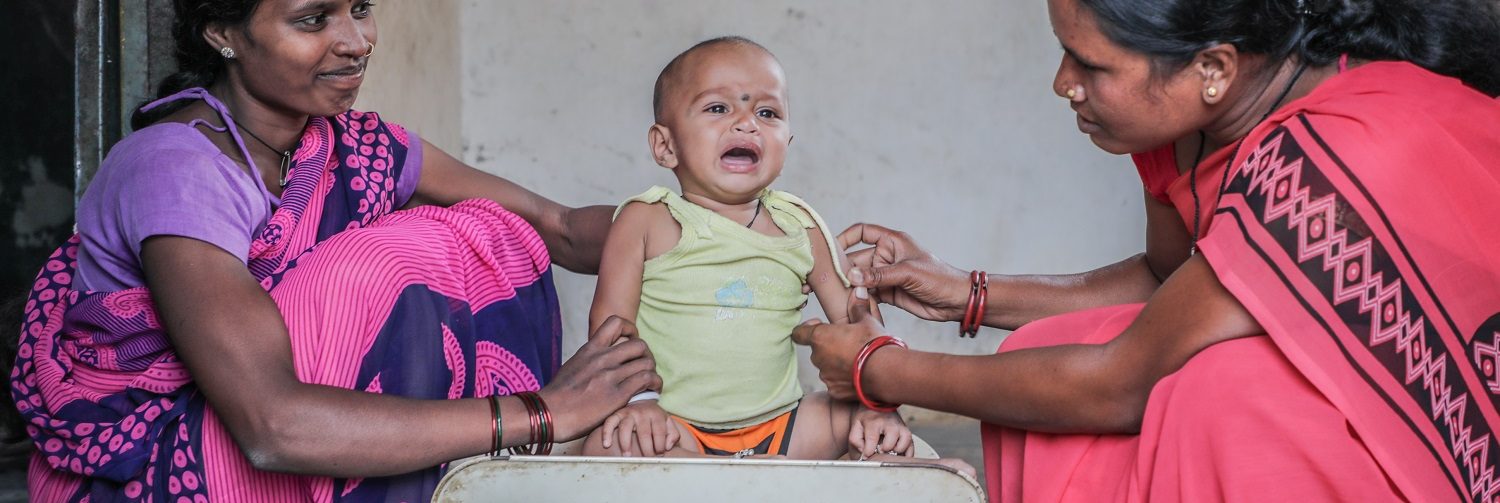As the nutrition community in India is steadily ramping up its collective action towards the goal of attaining malnutrition-free India by 2022, the nutrition research community, along with high-level policy stakeholders from the NITI Aayog, relevant ministries, and development partners gathered at a day-long event on "Delivering for Nutrition in India: Insights from Implementation Research" in New Delhi on 24 September 2019.
Pointing to the importance of implementation research, Dr Marie Ruel, Director of IFPRI's Poverty, Health, and Nutrition Division, said in her keynote address, “We know what to do but we do not know how.” Implementation constraints are a key obstacle to achieving impacts on nutrition at scale and there is a need for evidence on how to adopt, adapt, implement and scale-up nutrition interventions.
Coinciding with the National Nutrition Month, the event was organized by the International Food Policy Research Institute (IFPRI), the National Institute of Nutrition (NIN), India’s premier nutrition research institute and NITI Aayog, India’s national policy think-tank. It was supported and co-hosted by the Bill & Melinda Gates Foundation, Alive & Thrive (A&T), UNICEF, the Children’s Investment Fund Foundation (CIFF), the World Bank, and The India Nutrition Initiative (TINI). The key objectives were to share findings from ongoing or recently completed implementation research studies in nutrition and deliberate on ways of tapping into research findings to help strengthen the coverage, equity and quality of nutrition programs in India.
In the opening session on why implementation research matters for scaling-up nutrition programs with equity and quality, Stuti Tripathi from International Initiative for Impact Evaluation (3ie) shared about an implementation research evidence gap map that is being developed for nutrition-specific interventions to gather evidence on the implementation of nutrition programmes in India and identify where gaps in literature exist. “This evidence mapping exercise and other insights emerging at this event will provide important information as we review the current schemes and nutrition programs for the next financial year,” said Dr Alok Kumar, NITI Aayog's Health and Nutrition Advisor.
The implementation of India’s National Nutrition Mission, or POSHAN Abhiyaan, is centred around the key pillars of supporting the scale-up and convergence of services for vulnerable populations - Technology (ICDS-CAS), Convergent Action Planning, Behavior Change Communication, and Training/Capacity Building. Data and data use are deemed central to the success of this mission.
In the technology-focussed session on m-health intervention and their role in service delivery, Shri Sajjan Singh Yadav, Joint Secretary of the Ministry of Women and Child Development, gave an overview and current reach of ICDS-CAS under POSHAN Abhiyaan for tackling malnutrition. Along with insights on technology integration from the ICDS-CAS process evaluation, presented by IFPRI, and data use in ICDS shared by IDinsight, learnings from a six-state study conducted by the National Institute of Nutrition on technology-based nutrition surveillance system were presented.
Evidence from global and national studies was shared on scaling up social and behavioral change communication (SBCC) through multiple platforms. Organizations including IFPRI shared global evidence from multiple evaluations of SBCC programs, Population Council presented evidence on women’s group platforms for health and nutrition SBCC, CARE India shared learnings from organizing community-based events like Annaprashan Diwas, and IDinsight presented insights on reaching families, reaching mothers and shaping behaviors based on the national SBCC survey.
Researchers from Institute of Economic Growth (IEG) and Accountability Initiative (AI) deliberated on the issues of frontline workers’ capacity, financing and governance and looked at the factors affecting implementation and delivery of ICDS services.
Discussing the critical issue of take-home rations - cash or hot meals - researchers from IFPRI and J-PAL South Asia presented global evidence on relative impacts of cash and food on child nutrition outcomes, and implications of global evidence for India’s cash transfer programs, respectively. An update of evidence on India’s ICDS Supplementary Nutrition Program was presented by BMGF. Researchers from IFPRI and Duke University talked about the evidence needs for “one full meal” programs for maternal nutrition and shared insights from implementation research on the Pradhan Mantri Matrutva Vandana Program (PMMVY), respectively. Design elements of a proposed effectiveness trial were shared by the Indian Council of Medical Research (ICMR) on testing the differential impact of cash versus food transfers in ICDS.
In a session focused on maternal nutrition implementation research, state-specific study findings from Uttar Pradesh and Rajasthan were presented by researchers from IFPRI, Indian Institute of Health Management Research (IIHMR) and IPE Global, respectively. Along with the oral presentations, there were poster sessions too on insights from on-going and completed studies that added an updated body of evidence on the major program pillars of POSHAN Abhiyaan and the key program platforms.
Speaking at the closing panel on the implications of the research for policy, Dr Vinod Paul, Member (Health) of the NITI Aayog, posed some pertinent questions to lead the way forward. He urged the research community to consider ways in which coverage can be improved with quality, efficiency and equity, and look at pathways to reach the highest possible coverage of nutrition interventions.
Concluding the event, Dr Purnima Menon from IFPRI said, “The research community must continue to share emerging insights on each of the thematic areas that India’s nutrition mission is focused on and help to inform the policy and program with evidence-based choices. In this process, implementation research is the beacon of light that tries to answer the crucial and pertinent questions on ensuring better scale, reach and effectiveness of nutrition interventions.”
Please find here the abstracts of papers and posters that were presented and photographs of the event.



